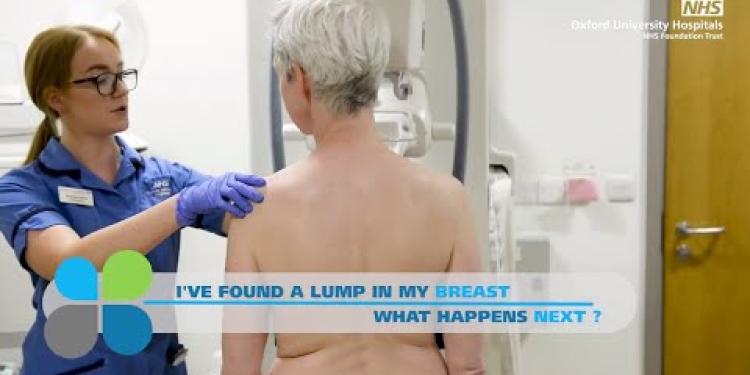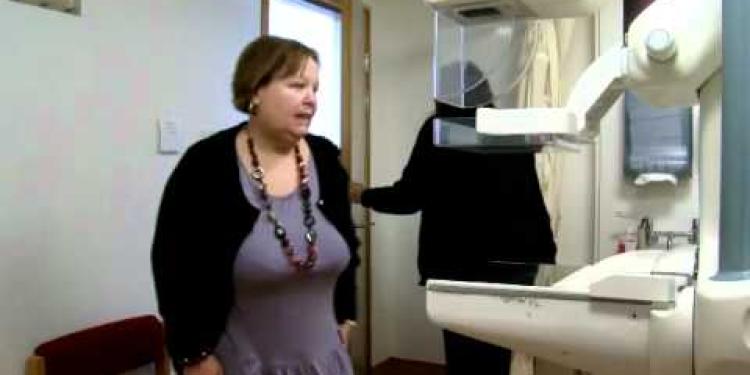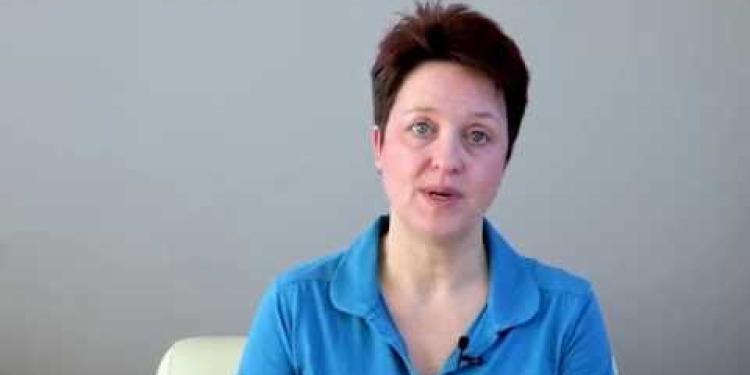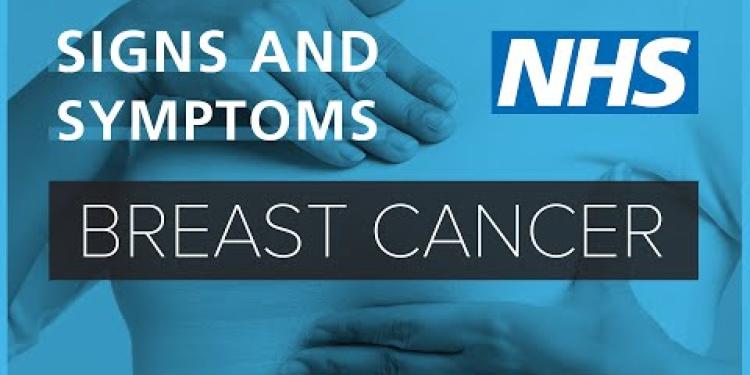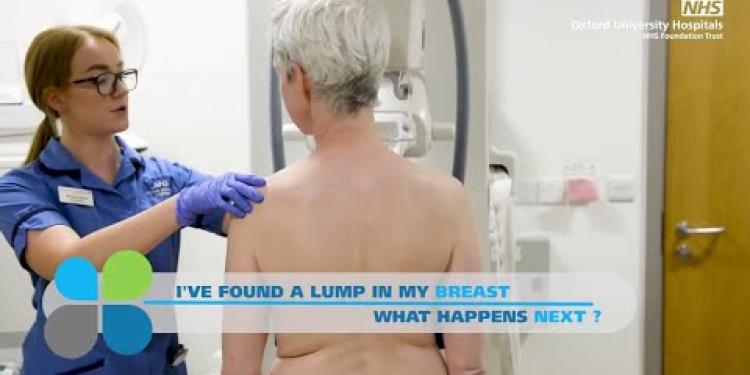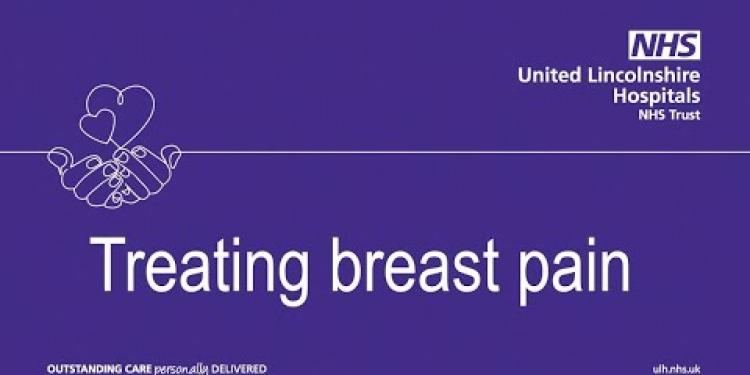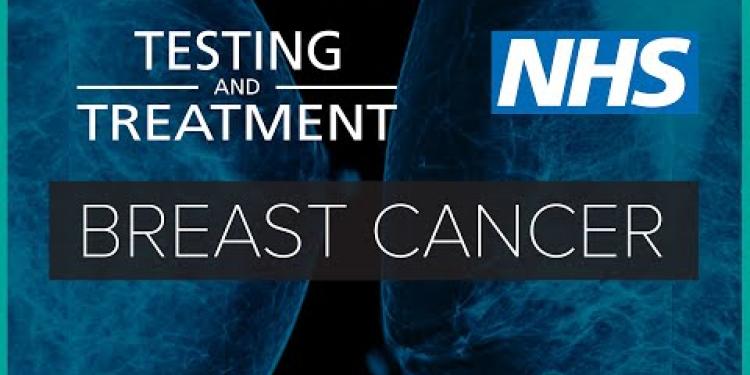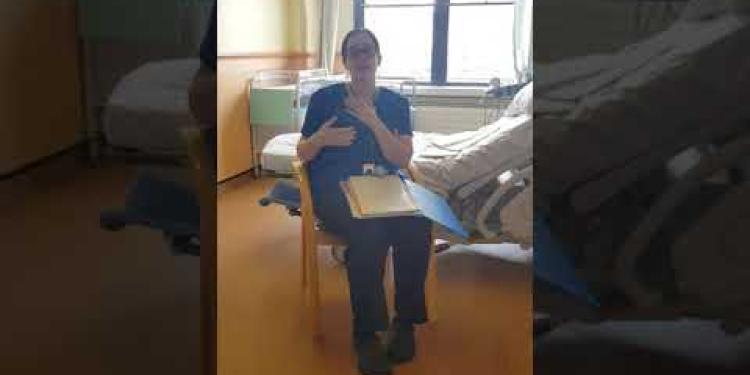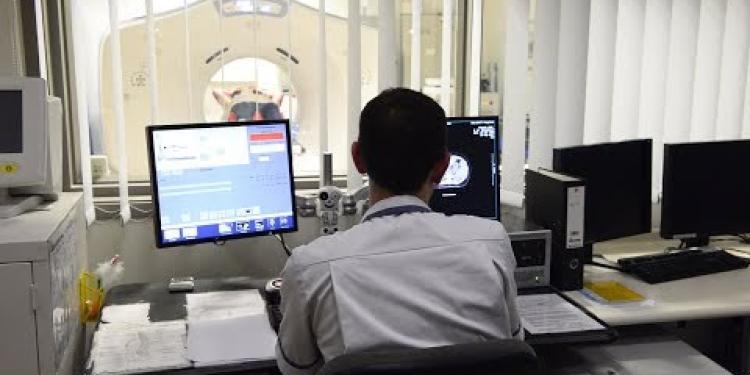Important Information On Using This Service
- Ergsy carefully checks the information in the videos we provide here.
- Videos shown by YouTube after a video has completed have NOT been reviewed by ERGSY.
- To view, click the arrow in the center of the video.
Using Subtitles and Closed Captions
- Most of the videos you find here will have subtitles and/or closed captions available.
- You may need to turn these on and choose your preferred language.
Turn Captions On or Off
- Go to the video you'd like to watch.
- If closed captions (CC) are available, settings will be visible on the bottom right of the video player.
- To turn on captions, click settings.
- To turn off captions, click settings again.
Find A Professional
Breast cancer screenig with NHS in the UK
Breast cancer screening with the NHS (National Health Service) in the UK is offered through the NHS Breast Screening Programme. Here's what you need to know about breast cancer screening in the UK:
- Who is Eligible: In England, women aged 50 to 71 are routinely invited for breast cancer screening every three years as part of the NHS Breast Screening Programme. In some areas, the age range may be extended to women aged 47 to 73 as part of a trial to assess the benefits and risks of screening in younger and older age groups.
- Invitation for Screening: Women eligible for screening will receive an invitation letter from their local breast screening unit, usually between the ages of 50 and 52 for their first invitation. The letter will include information about the screening process and how to book an appointment.
- Mammogram Screening: Breast cancer screening involves having a mammogram, which is an X-ray of the breasts. The mammogram is performed at a dedicated breast screening unit or mobile screening unit by trained professionals. During the mammogram, each breast is compressed between two plates to obtain images of the breast tissue.
- Results: After the mammogram, the images are reviewed by radiologists who specialize in breast imaging. Women will receive their screening results by mail within a few weeks. Most women will have a normal result, but some may be called back for further assessment if abnormalities are detected.
- Further Assessment: If further assessment is needed, women will be referred to a breast assessment clinic for additional tests, such as diagnostic mammograms, ultrasound scans, or breast biopsies. The majority of women who are called back for further assessment will not have breast cancer.
- Breast Awareness: In addition to routine breast screening, the NHS encourages women to be aware of the normal look and feel of their breasts and to report any changes or symptoms to their healthcare provider, regardless of their age or whether they have had a recent mammogram.
- Breast Cancer Screening for High-Risk Individuals: Women who are considered to be at higher risk of breast cancer due to family history or genetic factors may be offered additional screening or surveillance measures through the NHS or specialist services.
It's important for eligible women to attend breast cancer screening when invited, as early detection through screening can significantly improve the chances of successful treatment and survival. If you have questions or concerns about breast cancer screening, you can speak to your healthcare provider or contact your local breast screening unit for more information.
NHS Breast Cancer Screening
Introduction to Breast Cancer Screening
The NHS Breast Cancer Screening Programme is a vital health service in the United Kingdom, aimed at detecting breast cancer at an early stage. Early detection can significantly improve the chances of successful treatment and survival. The programme invites women between the ages of 50 and 70 for screening every three years, and the age range is currently being extended to include women aged 47 to 73.
What to Expect During Screening
The screening process involves a mammogram, which is an X-ray of the breasts. During the mammogram, each breast is compressed between two plates to obtain clear images. The procedure is quick, usually taking around 20 minutes. Some women may find it uncomfortable, but it should not be painful. The results are typically sent out within two weeks.
The Importance of Early Detection
Early detection of breast cancer through screening can lead to earlier treatment, which is often less aggressive and more effective. According to NHS statistics, breast cancer screening saves approximately 1,300 lives each year in the UK. It is important to attend screening appointments even if you feel perfectly healthy, as breast cancer can develop without noticeable symptoms.
Understanding the Risks and Benefits
While breast cancer screening has clear benefits, it is essential to be aware of potential risks. These can include false positives, where a mammogram appears abnormal, but no cancer is present, leading to further tests and anxiety. False negatives, though rare, can also occur, where a mammogram misses the presence of cancer. The NHS provides comprehensive information to help women make informed decisions about participating in the screening programme.
How to Book Your Screening Appointment
Women registered with a GP will automatically receive an invitation for breast cancer screening, but if you are aged over 70, you can still request an appointment by contacting your local breast screening unit. It is easy to find your nearest screening service on the NHS website or by speaking to your GP. Do not hesitate to get in touch with healthcare professionals if you have any concerns or questions about the screening process.
Checking for Breast Cancer with NHS in the UK
Breast cancer checks are done by the NHS (National Health Service) in the UK. Here is what you should know:
- Who Can Get Checked: In England, women aged 50 to 71 are invited for a breast check every three years. Some areas may invite women aged 47 to 73 to see if checks help younger and older women too.
- Getting an Invitation: Women will get a letter inviting them for their first breast check between ages 50 and 52. The letter will tell them how to book their appointment.
- Mammogram Checks: The breast check is done by taking a special X-ray called a mammogram. This is done at a breast check clinic or in a mobile unit. During the mammogram, each breast is gently pressed between two plates to take the X-ray pictures.
- Finding Out Results: Experts look at the X-ray pictures. Women will get their results in the mail in a few weeks. Most results are normal, but some women may need extra checks if something unusual is seen.
- If More Checks Are Needed: If needed, women will go to a special clinic for more tests like another mammogram, an ultrasound, or a small sample of breast tissue. Most women who have extra checks do not have breast cancer.
- Knowing Your Breasts: Women should also know what their breasts usually look and feel like. They should tell their doctor if they notice any changes, no matter their age or if they had a recent mammogram.
- Extra Checks for High-Risk Women: Women with a family history of breast cancer may get more checks. They can talk to the NHS or special services about this.
It is important for women who get invited to attend their breast check. Early checks help find problems sooner, which can make treatment easier. If you have questions, talk to your doctor or the local breast screening clinic for help.
NHS Breast Cancer Screening
Introduction to Breast Cancer Screening
The NHS Breast Cancer Screening Programme helps find breast cancer early. Finding cancer early can help with treatment. Women aged 50 to 70 can get a free screening every three years. Soon, women aged 47 to 73 will also be invited.
What to Expect During Screening
Screening involves a mammogram, which is a special X-ray of the breasts. In a mammogram, each breast is gently pressed between two plates to get a clear picture. It takes about 20 minutes. It might feel uncomfortable, but it should not hurt. You should get your results in about two weeks.
The Importance of Early Detection
Finding breast cancer early can mean easier treatment. The NHS says screening helps save about 1,300 lives each year in the UK. It is important to go for screening even if you feel healthy, because breast cancer might not show any signs.
Understanding the Risks and Benefits
Screening has many benefits, but there are some risks too. Sometimes, a mammogram might show something that looks like cancer but is not. This might cause worry and more tests. Rarely, a mammogram might miss cancer. The NHS gives information to help women decide about screening.
How to Book Your Screening Appointment
Women with a GP will get a letter to invite them for screening. If you are over 70, you can still book a screening by calling your local breast screening unit. Check the NHS website or ask your GP to find your nearest screening service. If you have questions, ask your healthcare team.
Frequently Asked Questions
What is breast cancer screening?
Breast cancer screening involves checking a woman's breasts for cancer before there are signs or symptoms of the disease. The NHS Breast Screening Programme invites women aged 50 to their 71st birthday for a mammogram every three years.
Who is eligible for NHS breast cancer screening?
Women aged between 50 and 71 are invited for a mammogram every three years. In some areas, women aged 47 to 73 are invited as part of a trial to extend the programme.
How can I book a breast screening appointment?
If you are eligible, you will receive an invitation by post. If you haven’t received your invitation by the time you turn 53, contact your local breast screening unit to book an appointment.
How is the screening done?
Screening is done using a mammogram, which is an X-ray of the breast. It typically takes about 5 to 10 minutes.
What should I expect during a mammogram?
During a mammogram, each breast will be compressed between two plates and X-rayed. The compression lasts only a few seconds and is necessary to get a clear picture.
Is breast cancer screening painful?
Some women might find the compression during a mammogram uncomfortable or slightly painful, but it usually only lasts a few seconds.
How do I prepare for a mammogram?
On the day of your appointment, wear a separate top and bottom, as you will need to undress from the waist up. Avoid using deodorants, powders, or lotions on your breasts or under your arms, as they can affect the X-ray.
Are there any risks associated with breast screening?
While mammograms use low doses of radiation, their benefits outweigh the risks. However, they can sometimes lead to false positives or false negatives, and not all cancers detected through screening can be treated effectively.
What should I do if I have breast symptoms but am not due for screening?
If you notice any unusual changes in your breasts, such as lumps, changes in size or shape, or discharge from the nipple, see your GP as soon as possible, regardless of your screening schedule.
Can men undergo breast cancer screening?
Routine breast screening is not offered to men because breast cancer is much rarer in men. If you are concerned about your risk, talk to your GP.
When will I get my results?
You should receive your results by post within two weeks of your mammogram. If you haven't received them by then, contact your local breast screening unit.
What happens if my screening result is abnormal?
If your results show anything abnormal, you will be referred to a specialist clinic for further tests. Abnormal results do not necessarily mean you have cancer.
How accurate is breast screening?
Breast screening can detect about 8 out of 10 breast cancers. However, not all cancers detected can be successfully treated, and some cancers may be missed.
What if I no longer want to be part of the breast screening programme?
You can opt-out of the NHS Breast Screening Programme by contacting your local breast screening unit. Your GP can provide you with more information on the risks and benefits of screening.
Can I get screened if I am under 50 or over 71?
If you have a higher risk of breast cancer, you may be eligible for screening before 50 or after 71. Speak to your GP to discuss your individual risk and screening options.
What is breast cancer screening?
Breast cancer screening is a way to check if your breasts are healthy. It helps find breast cancer early, when it is easier to treat.
The screening is a special test called a mammogram. It is like an X-ray for your breasts.
Ask your doctor if you can get this test. They can help you decide.
Helpful Tip: You can use a calendar or phone app to remind you about your doctor visits and tests.
Breast cancer screening is a way to check a woman's breasts for cancer. This is done before there are any signs or problems. The NHS invites women aged between 50 and 71 for a screening test called a mammogram every three years.
Who can have an NHS breast check?
If you are a woman and aged 50 to 71, you can have a breast check through the NHS.
It's good to check your breasts at home too. This helps find any changes early.
If you have any worries, talk to your doctor.
Women who are 50 to 71 years old can have a special breast check every three years. In some places, women who are 47 to 73 years old can also have this check. This is part of a test to see if the program should be bigger.
How can I make a breast check appointment?
Do you want to make a special doctor's appointment to check your breasts? Here is how you can do it:
- Ask your doctor: Talk to your doctor or nurse. They can help you make the appointment.
- Call the clinic: Find the phone number for the place that does breast checks. Give them a call and ask for an appointment.
- Online booking: Some clinics let you book on their website. Ask someone to help if you need it.
Tools that can help you:
- Calendar: Write the day and time of your appointment so you don't forget.
- Reminders: Use a phone or a sticky note as a reminder.
If you can have the test, they will send you a letter. If you don't get the letter by the time you are 53, call your local breast screening place to set up a visit.
For help with reading, you can use text-to-speech tools.
How is the screening done?
The screening test checks if you are healthy. Here is how it works:
1. You visit a doctor or nurse.
2. They might ask you questions about your health.
3. They might do a simple test, like checking your blood.
If you feel scared or worried, you can:
- Bring a friend or family member with you.
- Ask the doctor or nurse to explain what they are doing.
- Use pictures or videos to understand better.
Doctors check your breasts with a special picture called a mammogram. It is like an X-ray. It usually takes about 5 to 10 minutes.
What happens in a breast x-ray (mammogram)?
A breast x-ray is a helpful test to check your breasts.
Here's what will happen:
- You will go to a special clinic or hospital.
- A nurse or technician will explain the test to you.
- You will stand in front of an x-ray machine.
- The machine will take pictures of your breasts.
- The test usually takes about 20 minutes.
- It might feel a little uncomfortable, but it should not hurt.
If you feel worried, you can talk to the nurse. You can also bring a friend or family member to help you feel better.
When you have a mammogram, each breast is gently squeezed between two plates. Then, an X-ray is taken. The squeezing only lasts a few seconds and helps to get a clear picture.
Does breast cancer screening hurt?
Breast cancer screening is a check-up to look for signs of cancer. Some people might feel a bit of squeezing or pressure. It might feel uncomfortable but it should not be very painful. If you feel pain, tell the person doing the test. They can help you feel better.
To make it easier, try to relax and take deep breaths during the test. You can also ask a friend or family member to come with you for support. Remember, it is okay to ask questions if you are worried.
Having a mammogram can feel a bit tight or it might hurt a little, but it doesn’t last long. It’s over in just a few seconds.
If you feel worried, you can talk to the nurse or doctor. You can also take deep breaths or squeeze a stress ball to help you relax.
How do I get ready for a breast x-ray (mammogram)?
A breast x-ray is a special picture of the inside of your chest. The picture helps doctors look for any problems.
Here are some tips to get ready:
- Wear a shirt that you can take off easily. It’s better to wear a shirt with pants or a skirt.
- Don't use any cream, powder, or deodorant before the x-ray. These can make it hard to see the picture clearly.
- If you feel worried, tell a friend or family member. They can come with you to the appointment.
- Let the doctor know if you have any questions. You can write down your questions before you go.
You can ask the doctor's office if they have a guide or picture book to help you understand.
On the day you go to the doctor, wear a top and bottom that are not connected. You will need to take off your clothes from the waist up. Do not put on deodorant, powder, or lotion under your arms or on your chest. These can make the X-ray not work right.
Is breast screening safe?
Breast screening is a safe way to check for cancer. Sometimes, it can find changes in the breast that are not cancer.
If you are worried, talk to your doctor or nurse. They can help explain things.
You can also use pictures and videos to learn more about breast screening.
Mammograms are tests that use a small amount of radiation to look for signs of cancer in the breasts. The good things about mammograms are more important than the small risks from the radiation. But sometimes, mammograms might show a problem that isn't there, or they might miss a real problem. Also, finding cancer with a mammogram doesn't always mean it can be cured.
If reading is hard, using tools like text-to-speech software or asking someone to read with you can help. It's also good to ask questions if something isn't clear.
What to do if you notice changes in your breast
If you see or feel something different in your breast, don't wait. Talk to a doctor or nurse. You can do this even if it is not time for your regular check-up.
Here are some helpful things to try:
- Write down: Make notes about what you see or feel. This will help when you talk to your doctor.
- Ask for help: Bring a friend or family member with you to the doctor. They can help you remember what the doctor says.
- Use pictures: If you have pictures or drawings of breasts, they can help you show what is different.
- Plan questions: Think of questions you want to ask the doctor ahead of time. It’s okay to ask lots of questions!
If you see anything different about your breasts, like bumps, changes in how big or small they are, or any liquid coming out of the nipple, tell your doctor right away. It doesn't matter when your next check-up is supposed to be. It's important to get it checked now.
Can men have checks for breast cancer?
Boys and men do not usually get breast checks because breast cancer in men is very rare. If you are worried, talk to your doctor. They can help you.
When will I get my results?
You will get your results on a certain day. Ask your teacher or look at your school papers to know the date.
If you find reading hard, you can:
- Ask someone to help you read.
- Use an app that reads text out loud.
- Break the text into small parts to read slowly.
You should get your results by mail two weeks after your mammogram. If you do not get them by then, call your local breast screening office.
What does it mean if my test result is not normal?
If your test results are not normal, doctors will send you to see special doctors. You might need more tests. Not normal results do not always mean you have cancer.
How good is breast screening?
Breast screening is a way to check for signs of breast cancer. It is not perfect, but it helps doctors find cancer early.
Here are some important things to know:
- Breast screening can find some cancers early before you feel any lumps.
- Sometimes, it may not catch all cancers.
- It may also show something that looks like cancer, but it is not.
Ask your doctor if you have questions about breast screening. They can help explain it to you.
Using pictures or videos can help understand more about breast screening.
Breast screening can find about 8 out of 10 breast cancers. But not all cancers found can be cured, and some cancers might not be found at all.
Helpful Tip: Ask a friend or family member to help you understand tricky words.
Support Tools: Use apps that can read text out loud. They can help you follow along with the words.
What if I don't want to be in the breast screening program anymore?
If you decide you don't want to be in the breast screening program, that's okay. You can choose to stop.
Here is what you can do:
- Tell your doctor or nurse that you want to stop.
- You can write a letter or call the place where you usually get your screenings.
If you feel unsure or have questions, you can:
- Talk to your doctor or nurse. They can help you understand more.
- Use a trusted website to read more information or watch videos about breast screening.
Remember, it's okay to make a choice that's best for you!
You can choose not to join the NHS Breast Screening Programme. To do this, talk to your local breast screening office. Your doctor, or GP, can tell you more about what is good and what might not be so good about screening.
Can I have a health check if I am younger than 50 or older than 71?
If you have a higher chance of getting breast cancer, you might be able to have check-ups before you turn 50 or after you are 71. Talk to your doctor to find out what is best for you and about ways to have these check-ups.
Useful Links
Useful links from: I've found a lump in my breast - What happens next? The breast diagnostic clinic
- NHS - Breast Cancer Overview Information from the NHS on the symptoms, diagnosis, and treatment of breast cancer.
- NHS - Breast Lumps Guidance from the NHS on what steps to take if you find a lump in your breast and when to see a GP.
- Breast Cancer Now - Your Breast Clinic Appointment Breast Cancer Now provides information on what to expect at your breast clinic appointment and the diagnosis process.
- Macmillan Cancer Support - Breast Lumps Macmillan Cancer Support offers advice on breast lumps, including potential causes and the steps for diagnosis.
Useful links from: Tower Hamlets breast screening programme
- NHS Breast Screening Programme Official NHS page providing extensive information on the breast screening programme, its importance, procedures, and how to book an appointment.
- Tower Hamlets NHS Breast Screening Barts Health NHS Trust resource page dedicated to breast screening services in Tower Hamlets, including details on the local screening unit and contact information.
- Breast Cancer Now UK-based charity offering information and support on breast cancer screening, diagnosis, and what to expect from the screening process.
- Jo's Cervical Cancer Trust - Breast Screening Section Although primarily focused on cervical cancer, this UK charity provides useful information on breast screening as part of their broader women's health resources.
Useful links from: Other Things You Need to Know About Breast Screening
- NHS - Breast Screening Official NHS page providing comprehensive information on breast screening, including the process, benefits, and how to get screened.
- Breast Cancer Now - Breast Screening Breast Cancer Now's in-depth guide on breast screening, including eligibility, the screening process, and follow-up procedures.
- Breast Cancer UK - Breast Screening Information from Breast Cancer UK about reducing breast cancer risk and the importance of regular breast screening.
- Macmillan Cancer Support - Breast Cancer Screening Macmillan Cancer Support's resources for understanding breast cancer screening and its role in early detection and treatment.
More Videos of Interestdiagnosis
This video also appears in these sectionsdiagnosis
Have you found an error, or do you have a link or some information you would like to share? Please let us know using the form below.
- Ergsy carfully checks the information in the videos we provide here.
- Videos shown by Youtube after a video has completed, have NOT been reviewed by ERGSY.
- To view, click the arrow in centre of video.
- Most of the videos you find here will have subtitles and/or closed captions available.
- You may need to turn these on, and choose your preferred language.
- Go to the video you'd like to watch.
- If closed captions (CC) are available, settings will be visible on the bottom right of the video player.
- To turn on Captions, click settings .
- To turn off Captions, click settings again.
